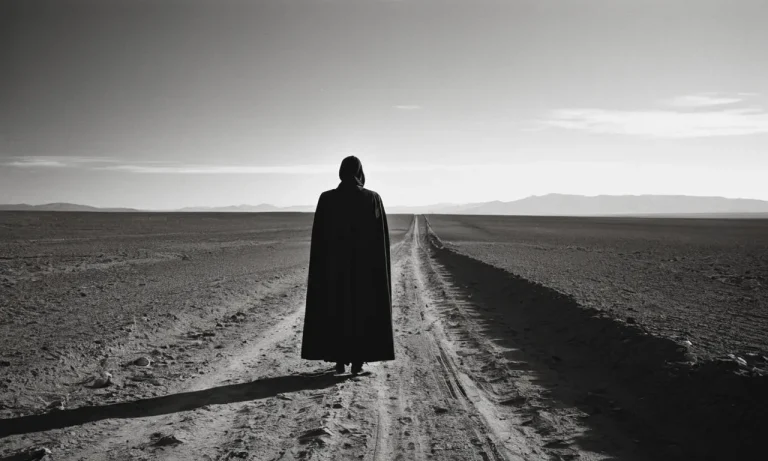Who Never Died In The Bible
The Bible contains many fascinating stories about people who lived extraordinarily long lives. In fact, some biblical figures never experienced death at all! If you’re short on time, here’s a quick answer to your question: Enoch and Elijah are the two main figures in the Bible who never died.
In this comprehensive article, we will explore the stories of Enoch, Elijah and other biblical figures who may have never died or experienced unusual longevity. We will examine relevant passages from the Old and New Testaments and analyze what these accounts reveal about God’s power over death and human mortality.
Enoch – Taken by God
Enoch’s Story
Enoch was a biblical figure who lived before the Great Flood. According to the Book of Genesis, Enoch was the great-grandfather of Noah. He lived for 365 years, which was a short life compared to other biblical patriarchs at that time (Genesis 5:23).
The Bible says that Enoch “walked faithfully with God” (Genesis 5:22). This means he likely obeyed God’s laws and commandments during his life. The book of Hebrews in the New Testament also commends Enoch’s faith, stating that “before he was taken, he was commended as one who pleased God” (Hebrews 11:5).
But what sets Enoch apart is that he did not experience a normal death. Genesis 5:24 says “Enoch walked faithfully with God; then he was no more, because God took him away.” This has led to Enoch being uniquely associated with being “taken” or translated to heaven by God while still alive.
Significance of Enoch’s Translation
Enoch’s miraculous translation to heaven has intrigued Bible scholars for centuries. Several aspects make it noteworthy:
- As one of only two biblical characters taken live to heaven, Enoch serves as an archetype of those who will experience the rapture when Jesus returns (Genesis 5:24; 2 Kings 2; 1 Thessalonians 4:17).
- Enoch’s faith pleased God and exempted him from death, foreshadowing salvation by grace (Hebrews 11:5).
- His early translation before the Flood emphasizes him as a harbinger – prophets often warn of coming judgement.
In extra-biblical lore like the Book of Enoch, he is portrayed as a prophet who pronounced God’s judgement on the fallen angels and the unrighteous. Jude 1:14-15 may reference this tradition of Enoch.
| Translation Type | Biblical Character |
|---|---|
| Without seeing death | Enoch, Elijah |
| After return from dead | Jesus |
As one of only two biblical characters raptured alive, Enoch occupies a unique position in Judeo-Christian thought. His early assumption into heaven has inspired much speculation through the centuries. In the end, Enoch stands as an example of one whose faith God saw as perfect.
And by his translation, the Bible reminds us there are amazing promises beyond this life for the faithful.
Elijah – Taken in a Fiery Chariot
Elijah’s Miraculous Powers
Elijah was one of the most powerful prophets in the Old Testament. He performed many awe-inspiring miracles that demonstrated God’s power. Some of Elijah’s miracles included:
- Causing a widow’s jar of flour and jug of oil to refill for many days during a famine (1 Kings 17:8-16). This provided food for the widow, her son, and Elijah.
- Raising a widow’s son back to life after he had died (1 Kings 17:17-24). This demonstrated Elijah’s power over death.
- Calling down fire from heaven to consume Elijah’s sacrifice and altar on Mount Carmel (1 Kings 18:30-39). This discredited the prophets of the false god Baal.
- Praying and ending a 3-year drought by causing abundant rain to fall (1 Kings 18:41-45). This showed Elijah’s authority over the weather.
- Causing fire to come down from heaven and consume two groups of 50 men sent to arrest Elijah (2 Kings 1:9-12). This showed God’s protection over His prophet.
Through these and other miracles, God displayed His power and authority through Elijah. The dramatic miracles set Elijah apart as a uniquely empowered prophet of God.
The Chariot of Fire
One of the most famous stories about Elijah involves his departure from earth. According to 2 Kings 2:11, as Elijah and Elisha were walking together, “There appeared a chariot of fire and horses of fire, which separated the two of them. And Elijah went up by a whirlwind into heaven.”
This astonishing event marked the end of Elijah’s earthly ministry. Rather than experiencing a normal death, God supernaturally transported Elijah directly into heaven while he was still alive. The blazing fiery chariot and horses symbolized God’s glorious presence.
This extraordinary exit fit with the miraculous nature of Elijah’s life and ministry.
Elisha picked up Elijah’s mantle as it fell to the ground, indicating his succession as the next main prophet in Israel. Yet Elijah’s departure was so remarkable that it was still being talked about centuries later.
Even in the New Testament, the Gospels record discussions amongst the Jews about the possibility of Elijah reappearing from heaven based on this unusual departure (Matthew 17:10, Mark 9:11).
While most people in Biblical times experienced common deaths, Elijah was one of the rare exceptions whom God chose to remove from the earth in an awe-inspiring way. The whirlwind and chariot of fire that swept Elijah into the heavens forever stamped this prophet’s life with a seal of the supernatural.
Other Figures of Unusual Longevity
Methuselah
Methuselah is a biblical figure famous for his remarkably long life. According to the Book of Genesis, Methuselah lived to the incredible age of 969 years old (Genesis 5:27). This makes him the man who lived the longest in the Bible.
There are several interesting things to note about Methuselah’s life:
- If we take the biblical account literally, Methuselah lived approximately a millennium – no small feat!
- He was the son of Enoch, another remarkably long-lived man who apparently did not die but was simply “taken” by God (Genesis 5:24).
- Surprisingly, the Bible records very little other information about Methuselah besides the year he was born, the year he died, his lineage, and that he fathered Lamech. We know nothing else about this incredibly aged man.
Although Methuselah tops the Bible’s list of oldest people,accounts of his 969-year life strain credulity. Most scholars interpret it symbolically or mythologically rather than literally. Still, Methuselah remains fixed in popular imagination as a profoundly aged figure.
Melchizedek
Melchizedek is an enigmatic biblical figure who makes a brief but important appearance in the Book of Genesis. He is the king of Salem and priest of God Most High who blesses Abram and receives tithes from him (Genesis 14:18-20).
There are several remarkable – even mysterious – things to note about Melchizedek:
- His name means “king of righteousness.”
- He was both a king and a priest, a combination not permitted under later Levitical law.
- His genealogy is unknown – there is no record of his birth, death, or ancestry.
- He resembles Jesus Christ in some ways – a priest forever in the order of Melchizedek (Psalm 110:4; Hebrews 7:3).
For these reasons, Melchizedek is considered one of the most intriguing figures in the Old Testament. Modern scholarship leans toward viewing him as either an ancient Canaanite ruler or an archetype foreshadowing Christ. But the Bible gives few details about this unusual king-priest.
His origins, life, and death remain shrouded in mystery.
Conclusion
In the end, Enoch and Elijah stand out as the two primary biblical figures who escaped death. Their unusual translations from earth demonstrate God’s supreme authority over mortality. The examples of Enoch, Elijah and other extraordinarily long-lived people ultimately point towards faith in eternal life through Christ.








